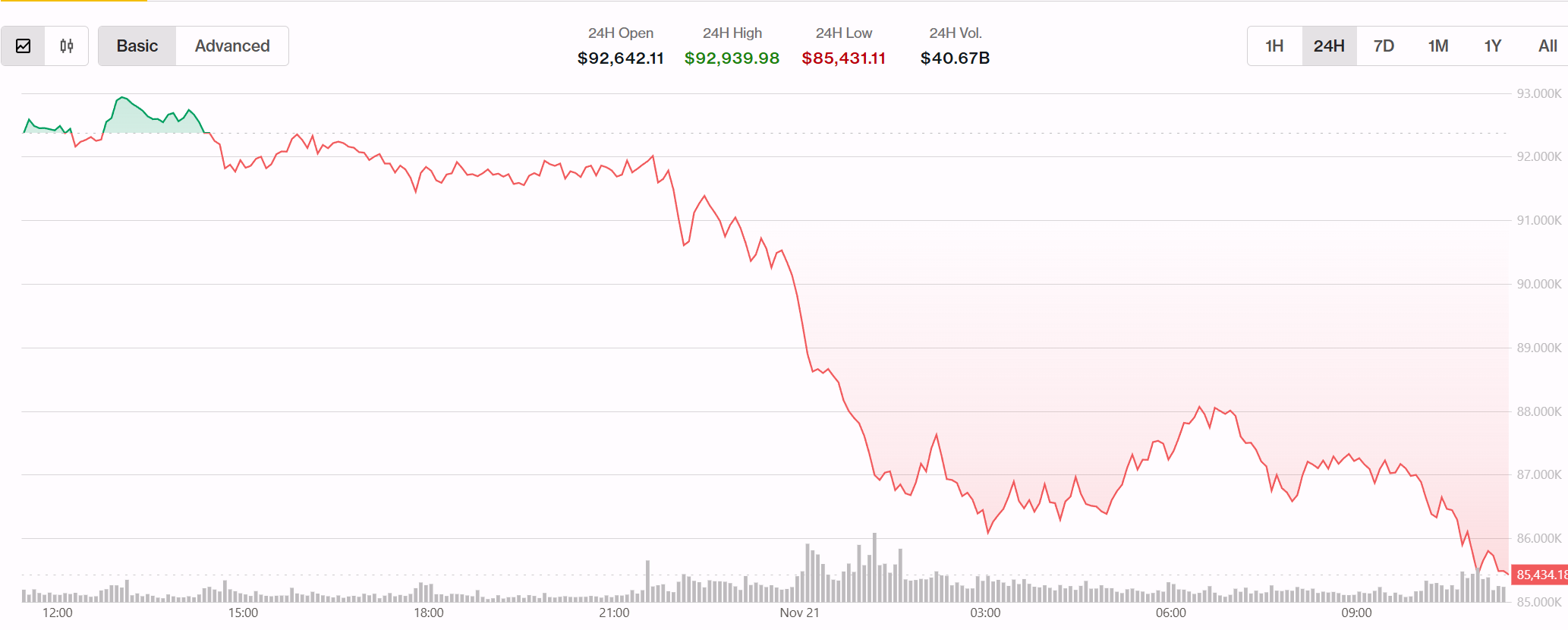BTC Falls Toward Mid-$80Ks as Market Structure Weakens Into Year-End
Bitcoin extended its slide Friday morning Hong Kong time, dropping below $85,500, CoinDesk data shows, as the market absorbed a fresh wave of selling pressure and another shift in global rate expectations.
The decline leaves BTC down more than 7% over the past 24 hours and more than 20% over the past month, outpacing losses across equities, which remain comparatively firm thanks to strong earnings from Nvidia, which fought off fears of an AI bubble.

In a note published on Telegram, market maker FlowDesk said the market continues to struggle amid a heavy supply of coins hitting centralized exchanges from long-dormant bitcoin wallets, with tens of thousands of coins moving after years of inactivity.
These flows have overwhelmed the bid, keeping spot activity decisively skewed toward sellers. The firm added that managers are now positioning defensively into year-end, more focused on protecting gains than adding exposure, which has thinned liquidity at key support levels.
FlowDesk also noted that derivatives flows mirror the weakness in spot, with large BTC and ETH buyers on the downside and traders rolling put positions lower to maintain protection as volatility curves remain heavily tilted toward puts.
Options data from Deribit shows a similar reversal in sentiment, CoinDesk previously reported, with the once-dominant $140,000 call now eclipsed by the $85,000 put, which has become the largest open-interest strike in the entire BTC options market as traders reposition for further downside.
As the market continues its slide, all eyes are now on MSTR as BTC's price edges towards MicroStrategy's average break-even point of $74,430.
In a recent note, JPMorgan said the stock’s underperformance reflects mounting anxiety over a possible removal from the MSCI index in January, a decision that could trigger billions in passive outflows and inject another layer of stress into an already fragile crypto market.
Disclaimer: The content of this article solely reflects the author's opinion and does not represent the platform in any capacity. This article is not intended to serve as a reference for making investment decisions.
You may also like
Rising Incidents of Air Rage Spark Appeals for Polite Travel, While Detractors Highlight Deeper Systemic Issues
- U.S. Transportation Secretary Sean Duffy launched a campaign urging travelers to restore civility in air travel, citing a 400% rise in in-flight outbursts since 2019. - The initiative promotes courteous behavior, such as assisting passengers and showing gratitude to crew, amid FAA data showing 13,800 unruly incidents since 2021. - Critics blame airlines for cramped seating and poor service, arguing civility efforts should address systemic issues like overcrowding and pricing rather than passenger attire.

Bitcoin Updates: Investors Flee Bitcoin, Boosting Gold and Income-Producing Tokens
- Bitcoin faces record outflows and institutional skepticism as ETFs lose $3B in November, with BlackRock’s trust seeing its largest single-day redemption. - Gold surges 55% annually, outpacing Bitcoin’s flat performance, while Harvard reallocates $218M to gold ETFs and Harvard’s endowment shifts toward physical assets. - XRP Tundra attracts Bitcoin investors with yield-generating features like 20% APY Cryo Vaults, offering diversification through dual-token governance and Solana integration. - Market fear

PENGU's Price Decline: An Analysis of Small-Cap Cryptocurrency Fluctuations During Shifting Market Sentiment
- PENGU's 2025 price plunge reflects systemic risks in small-cap crypto, driven by Bitcoin/Ethereum collapses and liquidity crises. - DAT sector's 60%+ declines (e.g., MSTR) and $19B October crypto liquidation highlight cascading market pressures impacting PENGU. - Low-volume tokens like PENGU face amplified volatility due to lack of fundamentals, regulatory clarity, or institutional support. - Broader flight from speculative crypto assets underscores small-cap tokens' role as macroeconomic anxiety proxies
Is Strategy Stock the Preferred Hedge Against Crypto Losses? Tom Lee Thinks So
